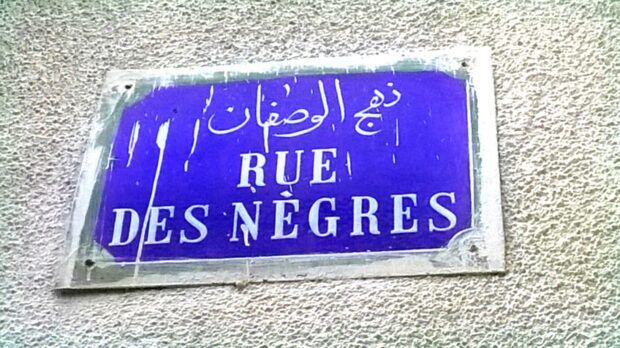By: RAFIK CHEKKAT

Voices from the Arab world, like that of Palestinian actress Maryam Abou Khaled, have touched off a debate over the racism suffered by the Black population of North Africa and the persistent legacy of centuries of Arabo-Berber slave-trading. While Franz Fanon wrote little on the subject, his analysis of racism from the victims’ viewpoint enables us to conceptualise a phenomenon which has for much too long been simply unmentionable in the Maghreb.
All his life, Fanon was directly and brutally confronted with racism. This was a harsh reality described in the accounts of his experiences in Martinique and with the “allied” armies during WWII, in the streets of Paris and Lyon and in those of occupied Algiers. His experience as a racialised person, seen by him as the best way to understand racism, enables him to provides us with precious tools for attempting to understand the psychological and cultural whys and wherefores of (racial) alienation, a comprehension of realities which he saw as a pre-condition to their “eradication”.
The author of “Black Skin, White Masks” was well aware of the close ties between the socio-economic and psychological aspects of racism. It was obvious to him that the alienation of Black people is not an individual matter and that there are intimate connections between consciousness and social context. But rather than conducting a study of the mechanisms of racism in abstract, general terms, he chose to undertake an empirical analysis of Black people’s condition, on the basis of his own. Contrary to the usual, conventional denunciations of racism, Fanon’s approach is essential in order to conceptualize both racism and overcome it at one and the same time.
TWO DOUBLE BINDS IMPOSSIBLE TODAY
While he referred regularly to history and sociology, Fanon was neither an historian nor a sociologist. Not only was he imbued with the ideas of his time, but his understanding of a certain number of realities could be limited or distorted by biases due among other factors to his social condition. Concerning the transatlantic slave trade, he believed that Blacks had failed to have a hand in their liberation and had been freed “from without” by their masters. Such assertions ignored the many slave revolts that marked the history of the Caribbean basin as far south as Brazil and are incorrect even if they are confined to Martinique.
It was not on his native island that Fanon situated his decisive experience of racism but in so-called metropolitan France. In the West Indies he acknowledged the existence of “a tiny hiatus” between “la békaille, la mulatraille et la négraille” (Whites, mixed race and Blacks), but West Indians settled for an “intellectual understanding of these divergencies”. He makes no mention of any expressions of White racism towards the Blacks of Martinique. “An Tan Robé” (during the time of Robert), when Vichy Marshall Georges Robert with hundreds of soldiers took charge of Martinique at the beginning of WWII, is never even mentioned. Though he witnessed the stormy and sometimes violent relations between French and Martinican sailors, Fanon never refers to these turbulent years, which were also a period of scarcities and hunger due to the embargo imposed on the island.
As former chief-physician at the Blida hospital, neither did Fanon have much to say about the relations between the non-Black populations of the Maghreb and the Senegalese and West Indian soldiers during WWII, and more generally the treatment of Blacks in North Africa. He was an implacable critic of colonial domination, which he regarded as a total social fact, and believed that the historic mission of his generation was to dismantle European colonialism and its deadly war machine. This may explain why he minimized a number of unpleasant realities, when he did not simply blame them on Western supremacy. Such over-simplifications were understandable in his day, considering how difficult it seemed to break the grip of Europe. Today, however, they are no longer tenable.
THE BURDENSOME LEGACY OF THE ARABO-BERBER SLAVE TRAFFIC
“It is true that most niggers easily become accustomed to servitude; but this predisposition results, as we have written elsewhere, in an organisational inferiority which makes them closely related to the beasts.” These words were written by Ibn Khaldoun around 1375, during a retreat spent in the Calâ at Ibn Selama near Tiaret (Algeria), over a century before Christopher Columbus set out on his expedition for the Queen of Spain which many regard as the point of departure for European modernity. Such a viewpoint would make racism a phenomenon having emerged with the Amerindian genocide and the Trans-Atlantic slave-trade. It is promulgated by authors such as C.L.R. James (Modern Politics, PM Press, 2013) or Anibal Quijano.
As is true wherever the phenomenon exists, racism in the Maghreb is bound up with material conditions and fulfils precise goals. Political decision-makers and mainstream media see racism as a means of disrupting the solidarities liable to form between the poorer classes. And in the minds of the latter, it expresses their refusal to be included among the dominated, which prompts them to put their membership in the group they perceive as in the majority before their class identity. It is not the least of racism’s ruses that it enables the ruling class – among other things – to “harness the poor to the chariot of the exploitation system” (David R. Roediger).
The Maghreb societies have recently become lands of transit and migration, which has changed the way people think and talk about race and racism. The vocabulary used today with reference to the refugees from sub-Saharan African bears an uncanny resemblance to the vocabulary used in France to describe Roms: welfare scroungers, parasites, delinquents, sorcerers, dirty germ-carriers… Accused in addition of stealing jobs from nationals, they are described as begging for a living and depending on welfare (practically inexistent in those countries) and as ferocious competitors on the job market. The word “African” has come to designate the continent’s Blacks, as though North Africa was not a part of it.
While official campaigns (in Tunisia) or originating with the civil society have been launched with mixed results, there can be no solution to this problem without taking into account its political and economic dimensions, i.e.:
➞ The poverty that drives tens of thousands of Africans to set out on the extremely dangerous trek across the Sahara, through the Maghreb and , when they have the wherewithal, to attempt the perilous Mediterranean crossing in the hope of reaching Europe;
➞ The role of national Maghrebi authorities who intern migrants in camps and deport them en masse (this is especially true in Morocco and more recently in Algeria, where the victims have been indiscriminately deported to Niger and in scandalous conditions); and in addition to the authorities of these countries, African governments as a whole are acting today as “ sub-contractors” of the migratory and security policies of the nations of Europe.
➞ The Western powers’ responsibility for the impoverishment of African societies as a whole and the destruction of States like Libya, plus their active complicity in the horrors now being perpetrated in that failed State, which has become the rear base for a gigantic traffic in human beings.
A PERSISTENT DENIAL
In daily life, Racism in the Maghreb takes the form of a promotion of everything that is established as “white” while analyses or testimonies produced by Blacks (nationals, exiles or students from sub-Saharan Africa) are objects of utter disregard. Yet many still deny the existence of any racism. The innumerable crimes of European colonisation and the often Eurocentric accounts of world history tend to obscure the horrifying reality of Arabo-Berber slave-trading. In addition to which, an omerta surrounds this racism in order not to disrupt the hypothetical unity among the wretched of the earth (or the community of the faithful) in the teeth of Western domination. Yet a unity based on the obfuscation of crimes past and present can only be nominal and highly suspicious.
It is true enough that the Arabo-Berber slave trade and today’s discriminations in the Maghreb are exploited by those who wish to have it out with Islam and the Arab world and who minimize the crimes of Euopean colonialism. The proliferation of articles on far-right web-sites and the fascination for this issue in the work of academics like Bernard Lewis or Kamel Daoud, the use of the expression ‘Arab-Muslim slave-trade’ as against “trans-Atlantic slave trade”, all of this can favour an attitude of denial among populations described in an essentialist mode as having been – almost since the dawn of history – violent conquerors and slavers. There is a rhetoric used to describe the Arab slave trade which adheres closely to the racist stereotypes applied to Atabs, there is no doubt about that. However, our silence on this question leaves the door wide open to the most reactionary rhetoric of all.
Because when racism in the Maghreb is discussed, the issue is not really the Maghreb at all, nor even “Arabs” as a group, but the violence and the discriminations inflicted on Black peoples. Fanon’s analysis of racism from the victims’ viewpoint teaches us how futile it is to claim that racism is a minority phenomenon: the fact is that all the people on the wrong side of the racial fence are its victims. And this is a fact which requires the attention of every single one of us.

Rafik Chekkat
Lawyer and essayist, intervenes mainly in matters of aliens law, criminal law and civil liberties. His writings deal with issues of racial representation in the media and cinema.
source: orientxxi.info


